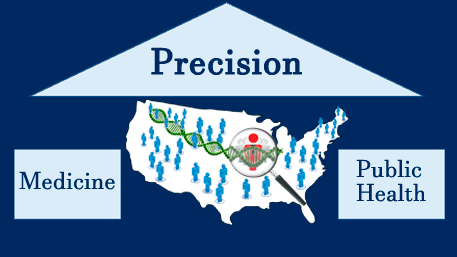From Precision Medicine to Precision Public Health: The Dialogue Continues
Posted on by A recent Nature article discusses the concept of precision public health (PPH) and raises concerns that too much emphasis on data and technology is “diverting attention away from regular public health.” In this post, we advance this important dialogue by focusing on two distinct components of PPH: its role in reaping the population health benefits of precision medicine, and its use of new tools and technologies to refine essential functions of population health assessment, policy development, and assurance.
A recent Nature article discusses the concept of precision public health (PPH) and raises concerns that too much emphasis on data and technology is “diverting attention away from regular public health.” In this post, we advance this important dialogue by focusing on two distinct components of PPH: its role in reaping the population health benefits of precision medicine, and its use of new tools and technologies to refine essential functions of population health assessment, policy development, and assurance.
The Population Health Benefits of Precision Medicine Require Public Health
The term “precision medicine” (PM) was proposed in 2011 by National Research Council committee that argued for a “new taxonomy of human diseases” based on advances in genomics and other technologies. PM promises improved health by accounting for individual variability in genes, environment, and lifestyle. In 2021, Francis Collins and Josh Denny reviewed advances in PM research in key areas including large cohort studies such as the All of Us Research Program, artificial intelligence, increasing inclusion of genomics in clinical testing, and more detailed measurements of health outcomes and exposures. New studies have led to refined diagnoses and promise more targeted disease treatment and prevention. We are beginning to see the fruits of research efforts in several areas such as cancer treatment, disease diagnoses, newborn screening, and others.
As PM matures over the next few years, its implementation in today’s health system could leave a lot of people behind. An important public health imperative is to ensure that everyone can benefit from advances in PM through population programs (e.g., newborn screening), public health policies, and implementation strategies driven by better population data. To ensure that PM discoveries can lead to improved health outcomes for all people, a public health equity agenda needs to address implementation disparities. Public health actions can be centered on population-specific needs and outcomes assessment, evidence development, and assurance of delivery of effective and ethical interventions. Crucial public health activities include engaging communities, building coalitions, improving health literacy, and building a diverse workforce. Without a concerted public health action, further advances in PM could further exacerbate population health disparities.
Precision Public Health is More than Population Applications of Precision Medicine
While the use of the term precision at the individual level seems well defined, its use at the population level has attracted some controversy. Some are concerned that the precision approach is diverting attention and resources away from other public health functions, and that a focus on new technologies such as big data, artificial intelligence and machine learning can distract from “bread-and-butter” public health methods.
We posit that traditional tools will continue to improve by the availability of “unprecedented quantities of data.” Even before the time of John Snow, the father of modern epidemiology, public health has sought to characterize disease occurrence in populations by time, place and persons. In that sense, there is nothing new to the fundamental tenets of precision public health. As Quakenbush elaborates, John Snow’s work on tracking a cholera outbreak in London could have been considerably accelerated if he had access to the precise geographic information systems that we have today. There is always room for innovation, for using technologies to help public health do what it does better, faster, and more precisely. As PM strives to deliver the “right intervention to the right patient at the right time,” PPH seeks to deliver “the right intervention to the right population at the right time.” In this context, using the term precision at the population level is no more extraneous than using the term precision at the individual level.
As discussed in the Nature article, pathogen genomics has been a clear success for PPH, even to those skeptical of the term. As Chowkwanyun said, “To not use these technologies strikes me as unambitious.” Pathogen genomics is a prototype for PPH, but its implementation relies on the ability of public health systems to use it in real time. “It’s great and it’s important but it has its limitations, especially when public-health departments are overwhelmed.” Basic health data, such as birth and death certificates and communicable-disease reporting, are the foundation for public health functions. When even basic data are lacking in many places around the world, it may be difficult to imagine using whole genome sequencing in public health.
Going Forward
In a recent tweet about the COVID-19 public health response, Dr. Tom Frieden, who served as CDC director between 2009 and 2016, said: “Artificial intelligence, machine learning, genomics, predictive modeling are all potentially important. But without better systems to track what’s really happening on the front lines in real time, they are a house of cards, not a sound foundation for life-and-death decisions.” Perhaps this quote summarizes the challenges ahead for PPH. As public health is attempting to improve on its data collection, analysis, dissemination and sharing through the data modernization initiative, we are seeing an evolution in our ability to meld new approaches with old approaches. Far from being blindsided by the data opportunities, next generation medicine and public health will continue to evolve by applying new tools and technologies to improve health for individuals and populations.
As always, we welcome comments and input to advance the dialogue around precision medicine and precision public health. Please submit your comments here.
Posted on by


